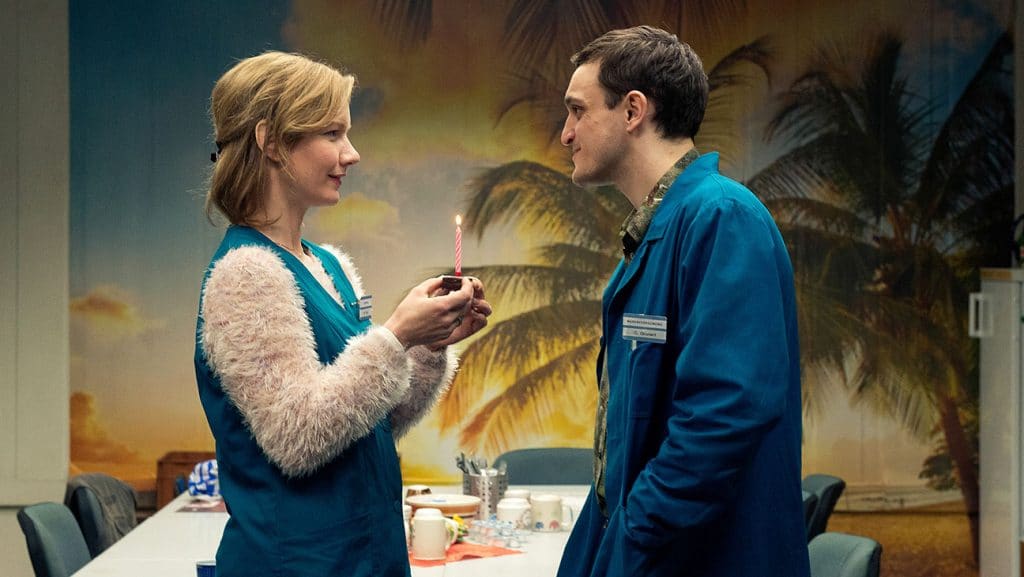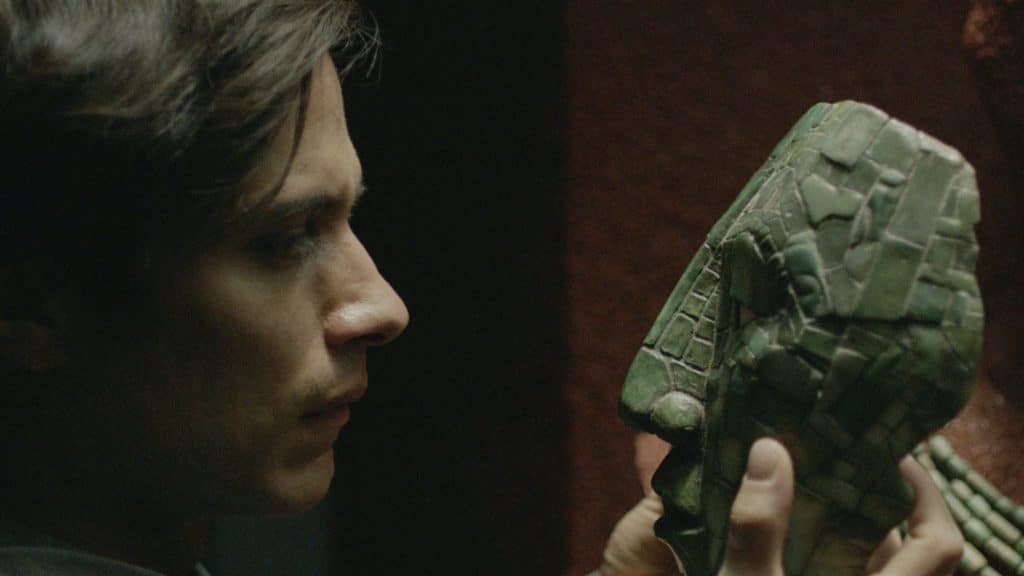Ninth- and tenth-day coverage of the 68th Berlin International Film Festival with reviews of Touch Me Not, Museum, Kim Ki-duk’s Human, Space, Time and Human and the German In the Aisles
Touch Me Not
Touch Me Not is a film that left me both fascinated and uncomfortable. Shot without an actual screenplay and edited from 250 hours of unscripted raw footage, this is a bold narrative experiment that blurs the line between documentary and fiction while forcing the audience to look very closely and intimately at unconventional faces and naked bodies in ways we are not used to. No wonder I saw a few people walking out of the Berlinale screening I attended, as it must be hard for some to allow themselves to be pushed into an experience that throws them out of their comfort zone. Those people will say they don’t need to see what a film like this wants to rub in their faces, but perhaps that is precisely the point.
When Touch Me Not begins, we see the camera gliding along the white skin and dark hair of a male naked body, almost touching it and basically illustrating Laura U. Marks’s concept of “haptic visuality.” We learn this is part of a research project carried out by director Adina (Adina Pintilie), who was given permission by Laura (Laura Benson), an Englishwoman in her 50s, to interview her in her bedroom and observe her efforts to deal with her trauma of intimacy with the help of therapists and other people, including Tudor (Tómas Lemarquis) and Christian (Christian Bayerlein), who each have their own physical and/or psychological impairments. Together, they seek to explore the many different facets of their tactile desires.
Adina (both director and character) is aware of the discomfort created by exposing ourselves to the intimacy of other people. We feel awkward and embarrassed, as if invading the characters’ personal space with close-ups and the use of shallow focus. Laura is usually kept in the corner of the frame and out of focus, which reinforces her emotional disconnection and misplacement. We see a man masturbating explicitly for the camera; a funny peep show of a trans sex worker; and even a beautiful moment when the “haptic” camera travels along Tudor’s hairless body in one direction and then returns in the opposite direction following Adina’s body, making us feel as though their bodies were one and we are all alike naked.
But the film also challenges our own guilt by forcing us to face Christian’s physical deformities and hear him talk about his sexual life. Tudor’s repulsion when looking at him will be certainly shared by most viewers, and there is something here that compels us to confront the origin of this feeling. What is beauty after all? What prevents us from seeking beauty in that which repels us? And why are we more drawn to a gorgeous couple engaging in dominance sexual roleplay than a handicapped couple making love? These questions seem to hover over these characters as they face their dissatisfaction with their bodies — bodies which they realize are just masks we wear. “I don’t care that I don’t have hair, it is just one mask less,” Tudor says.
Likewise, we are constantly reminded that this is part of a project and a film, sometimes with a peek behind Adina’s camera or when we see someone walk with a tripod in front of the screen. At one key moment, Tudor looks straight at us and says “I think we have an audience.” All this is edited quite fluidly, and the tense, uncomfortable score increases the response that Pintilie is seeking to obtain from the audience. For a film that wants to undress its characters naked and vulnerable, it is strange that we are never openly told who Adina is addressing in her voiceover or what exactly made Laura hate her father. Despite that, this is a beautiful film about the fear of touching and being touched, and opening up to someone else.
Museum (Museo)
On Christmas Eve in 1985, 140 Mayan and Aztec artifacts were stolen from the National Museum of Anthropology in Mexico. The thieves crawled into the basement through an air conditioning duct, unnoticed by nine police guards, and managed to open seven glass display cases in three exhibition halls and steal the most valuable portable objects from the museum, leading experts to assume that this was the work of a sophisticated gang of professionals. But four years later, when the Federal Police recovered most of the stolen gold, jade, turquoise and obsidian objects, they arrested one of the two purported thieves and found out the robbers were in fact amateurs — two veterinary school dropouts who had planned the heist for six months.
This unusual story that shocked the whole of Mexico is told in Alonso Ruizpalacios’s Museum, an adaptation — or “a replica of the original,” as the film puts it — that wants to be an amusing heist movie and also a character study, yet it works more as one than the other. The style brings to mind the old caper films of the ‘60s and ‘70s (the opening credits, the score and split screens), but with a modern feel to it, especially in the fast editing and dynamic scene transitions (like the cutting of a wire giving place to a plunger being pulled out of a syringe barrel). Museum has style and energy, and it is nice to see how it uses still frames in quick succession to show us the steps of the heist, as well as the use of silence to build tension.
In fact, Ruizpalacios proves on many occasions that he is a very talented director, like when he slowly moves his camera up to a higher angle in a close-up that shows thief Juan (Gael García Bernal) being told the pieces are unsellable (thus making him look powerless). Juan is portrayed as a young man obsessed with Mesoamerican culture and tired of a conservative middle-class family that enjoys mocking him at Christmas dinner. The film does a subtle job examining his motivations, like when we see his fascination with cliff divers in Acapulco or when he wets his bed after having a vision of his father — not to mention a scene in which he basically kisses his own reflection on the glass display case that protects the jade mask of Pakal.
More interesting is that Museum doesn’t overlook the irony that lies in the fact that there is no archeology without stealing, and that these thieves are not so different from those who obtain and sell artifacts clandestinely with the lame excuse that these pieces must be “protected” in a museum. But while the film works quite well in its first half, it gets lost later with situations that have no actual consequence, like Juan losing the pieces (only to find them immediately after) or mentioning a time when his friend Benjamin (Leonardo Ortizgris) almost blinded someone and he took the blame for him, which is a piece of information that just feels unnecessary.
Museum is even a bit clunky sometimes, with an annoying narration that needn’t be there and a weak sense of humor that could have been a lot better (“Heaven’s Gates are closed to you” is the worst), but still, it is a passable caper that manages to be amusing.
Human, Space, Time and Human (Inkan, gongkan, sikan grigo inkan)

One of the controversies surrounding the Berlinale this year has been the inclusion of Kim Ki-duk’s latest Human, Space, Time and Human in the program following an accusation of sexual assault made by an actress against the director. The victim, who preferred not to disclose her identity, accused him of slapping her three times and forcing her to perform unscripted nude sex scenes. Needless to say, Kim became a target of the #MeToo anti-sexual violence campaign when the festival (which boasted their support to the movement) was accused of hypocrisy for carrying out their initial decision on the basis that the allegations had been dismissed for lack of evidence.
But what puzzles me most is: if the festival wanted to value the art, not the artist — which would at least be understandable — then why bother to offer a platform to such an abysmal, loathsome and morally repellent piece of crap that has absolutely no redeeming value whatsoever?
Written by Kim himself, the film is divided into four chapters (the four nouns in the awful title) and takes place entirely on a ship whose destination has no importance. There, we are introduced to a gallery of characters: an evil rich Senator who wants to be President and his son; a Japanese straight couple; a group of troublemakers whose horrid leader quickly becomes the Senator’s right hand; a silent old man who seems to live on board the ship collecting dirt; and so on. See, this is supposed to be an ALLEGORY (capital letters), with the ship clearly representing human society divided into classes in some sort of Lord of the Flies scenario.
But Kim is no Darren Aronofsky, and so his pitiful attempt at an allegory comes off as horribly preachy in all the worst ways. In fact, Kim is best known for works in which characters speak little to nothing, but now he does the opposite, filling this junk with endless expository dialogue that feels insufferably repetitious and proves that writing lines is not his forte. Plus, the couple played by Joe Odagiri and Mina Fujii speak Japanese the entire time and everyone else in Korean, yet they all understand each other perfectly as if they spoke the same language — a weird decision that may have had a purpose in Dream (2008) but here is only gratuitous.
Then, after we witness a gang rape, the ship becomes supernaturally suspended in the sky with no radar. “Did this ever happen before?” someone asks in one of the most laughable lines ever. The Senator and his militia of lackeys take over the ship, declare martial law and decide they get to have the food. Everything is as subtle as a pink elephant dancing the Macarena on a piano, and from then on, we follow interminable discussions about food and a “poor” male in conflict for secretly raping a woman (no kidding). Others look for weapons on the ship to overthrow the “regime” even though they take forever to take any action after they find grenades (no shit).
All that is told in a sea of redundant dialogue — apparently for those who are blind or mentally impaired — including the likes of “You scared me,” “Why are you so cruel?” or even a ridiculous “WHYYY?” when Eve (Fujii) realizes she is pregnant. It is hard not to laugh either at nonsensical gems such as “If you eat me and live, I will also live” when cannibalism kicks in (hell, yes). And if Kim’s direction hits rock bottom with a pathetic grenade explosion and a scene in which day becomes night in just a few takes, his script is full of incoherence as well, like the villains locked in a room and showing up free only moments after.
Even worse is Kim’s pro-life morality full of preachy garbage about “waiting for God’s will” and with Eve deciding in less than a second that her baby (“a gift from you men”) must survive. In fact, Kim’s cynicism is so grotesque that he shows women letting themselves be groped by animalistic men and Eve enjoying being raped a second time by Adam (Keun-Suk Jang) (who, for some reason, speaks in Japanese with her). As I said, Kim is not Aronofsky — he is more like M. Night Shyamalan, getting worse and worse with each new film and making me even question my own judgment about his previous works.
And this time, by justifying rape as something completely natural and human, he managed to make me believe what his detractors say about him: that he’s also a despicable human being, with his last shot as almost indisputable evidence.
In the Aisles (In den Gängen)

In the Aisles is the kind of film that clearly doesn’t have that much to say (or apparently has no idea what it wants to say) but tries to be sweet as candy and leave the viewers with heart eyes like emojis. The purpose is quite simple though: to create something magical out of the prosaic and mundane, the way Amélie (2001) did. The only problem is that it feels hard to care about most of what happens on screen after a while, especially as things become tonally messier.
Structured into three chapters named after its three main characters, Thomas Stuber’s film is centered on Christian (Franz Rogowski), who begins his probationary period as a stock handler in a remote wholesale market. Taciturn and with a secret shady past, Christian is taken under the wing of Bruno (Peter Kurth), an older man and former truck driver who works at the drinks department and teaches him all sorts of tricks. Meanwhile, Christian falls in love with Marion (Sandra Hüller), who works on the sweets department. All this is narrated by him as he adapts to the job like in a modern fable of long aisles, shelves and forklifts.
Even though the aisles are shown to be a somber place that literally doesn’t see the light of day (there are no windows), there is a curious cheerful mood in what we see, especially when we hear Bruno talk about Forklift conflicts or the amusing nicknames of certain departments (like “Siberia” for frozen goods). The dull routine of the job is emphasized by repeated quick inserts of Christian’s collar, sleeves and name tag as he gets ready for work, and yet Stuber manages to find sweetness in the ordinary, like when Marion blows her hot cappuccino to the sound of sea waves and with the picture of a palm tree behind her on the wall.
But Stuber makes some strange choices too, and I don’t understand for example why he would care about close-ups of a cigarette being rolled or a toilet being flushed. Some gags fall completely flat too, like a bizarre security video, or when we see people eating from the trash (I fail to see what is supposed to be funny in that). My biggest problem, though, is how the movie gets lost in the third act when it becomes way too serious for the tone it was aiming at until then. There is a pointless conversation between Christian and Bruno and even a tragedy that feels so off that the impression I have is that the film doesn’t have any clear direction.
I also find it weird that Marion would live in such a huge, beautiful house and work at a supermarket, but who cares about that when the result is so harmless and dull? My impression is that, if this were an American movie starring Adam Sandler and, say, Meg Ryan instead of the actress of Toni Erdmann (2016), the general response would be a lot different.






